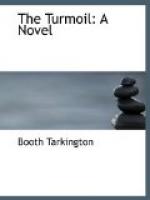The harsh roar of the city came in through the open window, continuously beating upon Bibbs’s ear until he began to distinguish a pulsation in it—a broken and irregular cadence. It seemed to him that it was like a titanic voice, discordant, hoarse, rustily metallic—the voice of the god, Bigness. And the voice summoned Bibbs as it summoned all its servants.
“Come and work!” it seemed to yell. “Come and work for Me, all men! By your youth and your hope I summon you! By your age and your despair I summon you to work for Me yet a little, with what strength you have. By your love of home I summon you! By your love of woman I summon you! By your hope of children I summon you!
“You shall be blind slaves of Mine, blind to everything but Me, your Master and Driver! For your reward you shall gaze only upon my ugliness. You shall give your toil and your lives, you shall go mad for love and worship of my ugliness! You shall perish still worshipping Me, and your children shall perish knowing no other god!”
And then, as Bibbs closed the window down tight, he heard his father’s voice booming in the next room; he could not distinguish the words but the tone was exultant—and there came the thump! Thump! of the maimed hand. Bibbs guessed that Sheridan was bragging of the city and of Bigness to some visitor from out-of-town.
And he thought how truly Sheridan was the high priest of Bigness. But with the old, old thought again, “What for?” Bibbs caught a glimmer of far, faint light. He saw that Sheridan had all his life struggled and conquered, and must all his life go on struggling and inevitably conquering, as part of a vast impulse not his own. Sheridan served blindly—but was the impulse blind? Bibbs asked himself if it was not he who had been in the greater hurry, after all. The kiln must be fired before the vase is glazed, and the Acropolis was not crowned with marble in a day.
Then the voice came to him again, but there was a strain in it as of some high music struggling to be born of the turmoil. “Ugly I am,” it seemed to say to him, “but never forget that I am a god!” And the voice grew in sonorousness and in dignity. “The highest should serve, but so long as you worship me for my own sake I will not serve you. It is man who makes me ugly, by his worship of me. If man would let me serve him, I should be beautiful!”
Looking once more from the window, Bibbs sculptured for himself—in the vague contortions of the smoke and fog above the roofs—a gigantic figure with feet pedestaled upon the great buildings and shoulders disappearing in the clouds, a colossus of steel and wholly blackened with soot. But Bibbs carried his fancy further—for there was still a little poet lingering in the back of his head—and he thought that up over the clouds, unseen from below, the giant labored with his hands in the clean sunshine; and Bibbs had a glimpse of what he made there—perhaps for a fellowship of the children of the children that were children now—a noble and joyous city, unbelievably white—




